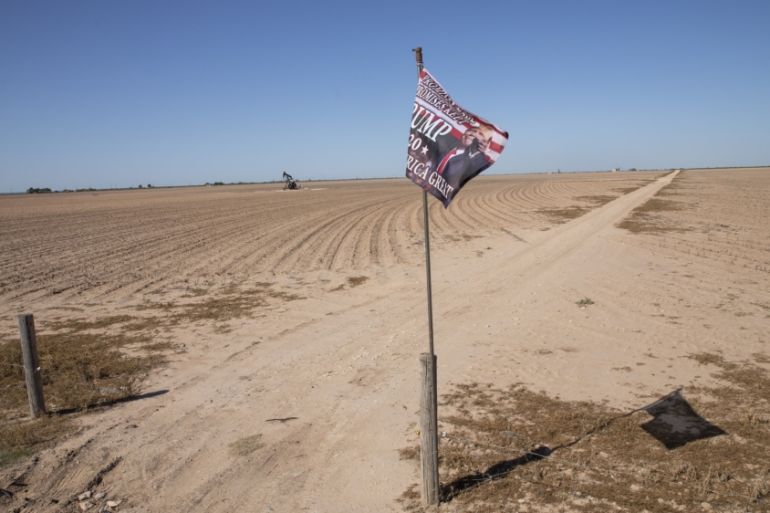Oil prices fall as analysts see more carnage on the horizon
Brent settled at $20 while WTI plunged almost 23 percent to settle at $13 as analysts warn of drawn-out market saga.

Oil prices plunged again on Monday as storage capacity in the United States continues to fill up, fuelling concerns that last week’s historic market carnage could repeat itself.
US West Texas Intermediate (WTI) crude for June delivery fell 23.14 percent, or $3.92 to settle at $13.02. Brent crude, the global benchmark, settled down $1.43, or 6.67 percent, at $20.01 a barrel, after touching a session low of $19.11. The June Brent contract expires on Thursday.
Keep reading
list of 3 itemsUS drillers say Trump strategic reserve plan is no lifeline
Crash! US crude futures turn negative for first time in history
“The drama of last week was simply rolled over from the May contract into the June 2020 contract,” Louise Dickson, oil markets analyst at Rystad Energy, told Al Jazeera.
Last Monday, prices dipped into negative territory for the first time in history when WTI’s May contract plummeted to -$40.32 before clawing back to settle at -$37.63.
US oil futures once again led losses today, fuelled by continuing concerns that storage at Cushing, Oklahoma, the delivery hub for WTI, could reach full capacity by mid-to-late May. The deadline to sell June contracts is May 19.
The coronavirus-induced slump in prices and hit on demand has battered the US shale oil industry particularly hard. US oil producers continue to shut in wells and have already laid off tens of thousands of workers.
The pain is reverberating beyond US borders. Brent crude took a dive last week as well, falling to 1999-level lows. The global benchmark has lost 70 percent in value since the beginning of 2020.
“Storage hubs around the world cannot handle the oversupply, not in May, not in June,” Dickson told Al Jazeera. “The WTI saga can be repeated next month – traders will be in the exact same predicament, if not worse, as the storage situation becomes more dire. The same script can play out in other parts of the world.”
The Organization of Petroleum Exporting Countries (OPEC) and its allies led Russia, a grouping called OPEC+, earlier this month committed to cutting output by a historic 9.7 million barrels per day (bpd) in May and June.
But analysts say that the curbs are not nearly enough to offset the estimated 30 million bpd drop in demand from the coronavirus pandemic.
Oil-producing countries that rely on crude for the lion’s share of their state revenue have found themselves in a tight fiscal squeeze.
Some countries are scrambling for ways to move even more supply off the market. Kuwait and Azerbaijan are coordinating their own oil output cuts. Russia is set to reduce its western seaborne exports by half in May. Saudi Arabia has also signalled that it would be open to additional production cuts.
And analysts say that even those measures are unlikely to help.
“Nothing can be done on the producer side, and there is little that can be done to change the radical limits to storage,” Laura James, senior Middle East analyst at Oxford Analytica, told Al Jazeera.
She added that the historic supply and demand shock will prompt oil-producing countries to redouble their efforts to diversify their economies away from fossil fuels.
“This crisis will have every single oil producer in the world making the same calculation – they see the shock hit to their oil budget and will make diversification an even bigger priority,” James said.
In the US, the federal government has limited power to order output cuts. And state regulators in oil-producing Texas, North Dakota, and Oklahoma, who can call for production to be reined in, last week postponed voting on mandated cuts.
With shale firms shutting down operations and no bottom to oil prices, the options seem to be decreasing by the day.
On Saturday, Oklahoma’s Governor Kevin Stitt asked President Donald Trump to declare the coronavirus pandemic an “act of God” to allow oil companies to halt operations without risking the cancellation of land leases for stopping production.
Meanwhile, tankers carrying 50 million barrels of Saudi crude are headed for US shores, sparking backlash from government officials and the shale industry, which are urging Trump to ban imports of Saudi crude.
Those following the markets, however, say that the White House is unlikely to act on those calls.
“The US and Saudi Arabia have a special and long-lasting economic and energy relationship,” Dickson added. “It would not behoove either party to alter the current status quo over a few barrels of oil.”